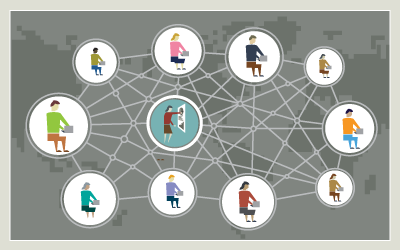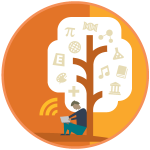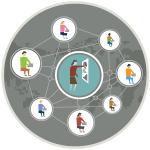 Today’s students expect education to be accessible, immersive, collaborative, personalized, and online-enriched.
Today’s students expect education to be accessible, immersive, collaborative, personalized, and online-enriched.
Informed by research about how students learn best, UBC is transforming the traditional classroom experience with rapid adoption of new teaching approaches and methods such as:
 Students learn through online content delivery and classroom instruction, giving them more choice over place, path or pace in their coursework.
Students learn through online content delivery and classroom instruction, giving them more choice over place, path or pace in their coursework.
 Inverts the traditional lecture-based classroom. Students watch short, online videos or pre-read before class, and class time is spent applying concepts or knowledge through in-class activities.
Inverts the traditional lecture-based classroom. Students watch short, online videos or pre-read before class, and class time is spent applying concepts or knowledge through in-class activities.
 Includes distance learning credit courses and courses where faculty have opted to offer their course exclusively online to alleviate scheduling conflicts or to open the course to a broader audience.
Includes distance learning credit courses and courses where faculty have opted to offer their course exclusively online to alleviate scheduling conflicts or to open the course to a broader audience.
 Course content produced by students, which can be used in current or future courses. Examples include: videos, exam questions, Wikipedia entries, blog posts, etc.
Course content produced by students, which can be used in current or future courses. Examples include: videos, exam questions, Wikipedia entries, blog posts, etc.
 Massive open online courses, offered exclusively online at no or low cost. Online forums or meet-ups allow students to interact.
Massive open online courses, offered exclusively online at no or low cost. Online forums or meet-ups allow students to interact.
 Dual-degree programs, field courses, and Co-op programs extend and enhance the classroom learning experiences, and are enabled by technology.
Dual-degree programs, field courses, and Co-op programs extend and enhance the classroom learning experiences, and are enabled by technology.
Ready to transform your teaching?
Since 1991, UBC has helped fund innovative course transformations. To date, the Teaching and Learning Enhancement Fund has supported more than a thousand projects.
See funding opportunities > See case studies >
Interested in professional development?
The Centre for Teaching, Learning and Technology offers free courses, workshops and events to help instructors enhance their teaching practices and learning technology skills.
Carl Wieman Science Education Initiative
In 1997, UBC physicist and Nobel laureate Carl Wieman started the Carl Wieman Science Education Initiative (CWSEI) with the goal of improving science education at this university—and beyond. By 2015, CWSEI has redesigned 100 science courses—affecting more than 15,000 students annually—and tracked the results. Active learning methods can boost reasoning and retention, and improve student engagement.